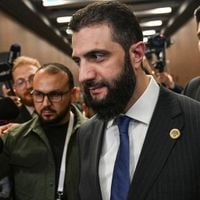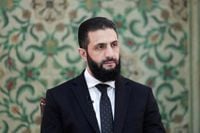On May 7, 2025, French President Emmanuel Macron welcomed Ahmed al-Charaa, the interim president of Syria, to the Élysée Palace in a historic meeting marking al-Charaa's first visit to the West since the fall of Bashar al-Assad. This visit has sparked considerable debate, as al-Charaa remains on international lists of suspected terrorists due to his past affiliations.
The Élysée stated to AFP that the meeting aims to "accompany the transition towards a free, stable, sovereign Syria that respects all components of Syrian society." Macron emphasized that he holds "no naivety" and stressed the need for vigilance against extremist movements. France has expressed deep concern over interfaith violence in Syria and is seeking concrete guarantees from al-Charaa regarding the fight against impunity. "The head of state will demand that his guest ensure that the fight against impunity becomes a reality," the Élysée noted.
Jean-Noël Barrot, France's Minister of Foreign Affairs, highlighted the significance of this meeting, stating that "the fight against terrorism, the control of migratory flows and drug trafficking, as well as the future of Lebanon, are at stake in Syria." The United Nations reports that 90% of the Syrian population lives below the poverty line, making the humanitarian crisis a critical issue for both countries.
During the meeting, Macron asked al-Charaa to do everything possible to protect "all Syrians without exception, regardless of their origin, religion, confession, or opinions." He also urged the Syrian leader to ensure that the perpetrators of recent interfaith violence targeting Druze and the Alawite minority are prosecuted. Macron advocated for the European Union to systematically sanction those responsible for such crimes.
Al-Charaa's visit comes at a time when the transitional authorities are calling for a gradual lifting of international sanctions imposed since the civil war began in 2011. While Paris is open to easing certain European sectoral measures, it believes it is too early to lift UN sanctions against al-Charaa himself. The French government sees the lifting of sanctions as a vital lever for the reconstruction of Syria.
Despite the diplomatic overtures, al-Charaa's visit has been met with fierce opposition. The Collectif franco-alaouite organized protests in Paris, accusing the interim president of "genocide" and "ethnic cleansing." Marine Le Pen, leader of the far-right National Rally party, expressed her "stupefaction and consternation" at the reception of a man she labeled a "jihadist who went through Daesh and Al-Qaeda." Éric Ciotti, a prominent figure in the Les Républicains party, denounced the meeting as a "red carpet at the Élysée stained with the blood of victims of Islamist terrorism," while Laurent Wauquiez labeled it a "serious mistake," asserting that France should not engage with leaders from organizations that have attacked the nation.
Al-Charaa's rise to power has been controversial. He was appointed interim president following the fall of Assad's regime in December 2024 and leads a coalition that has been accused of committing atrocities, including a massacre in March 2025 that left 1,700 dead, primarily from the Alawite community. Despite promising to pursue those responsible for the violence through an "independent commission of inquiry," no action has yet been taken.
Macron's decision to engage with al-Charaa reflects a broader strategy to maintain France's influence in the region amid a complex geopolitical landscape. The French government believes that not engaging with the transitional authorities would be irresponsible and could allow extremist groups like Daesh to gain ground.
During a joint press conference following their meeting, Macron reiterated France's commitment to supporting a new Syria that respects all societal components. He underscored the importance of establishing a government that represents all segments of Syrian society, particularly in light of the ongoing humanitarian crisis.
Al-Charaa's visit was facilitated by a UN exemption, allowing him to travel despite his ongoing sanctions due to his previous leadership of the Hayat Tahrir al-Sham group, which has ties to Al-Qaeda. His presence in Paris symbolizes a significant shift in diplomatic relations and the potential for a new chapter in Syrian politics.
As al-Charaa seeks international recognition and advocates for the lifting of sanctions, the French government is navigating a delicate balance between diplomatic engagement and accountability for past atrocities. The outcome of this meeting could have lasting implications for Syria's future and its relationship with Western nations.
In a world where the lines between diplomacy and ethics often blur, Macron's decision to welcome al-Charaa is both a calculated risk and a potential opportunity for change in a region long plagued by violence and instability. The international community watches closely as these developments unfold, highlighting the complexities of post-conflict governance and the challenges of rebuilding a nation torn apart by war.


